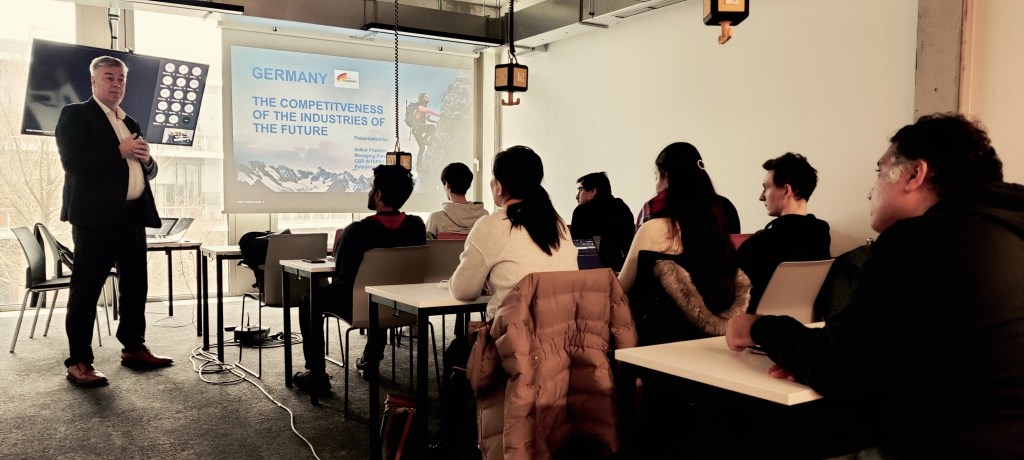
Complete Guide: Iranian Student Visa Requirements for German Universities
Did you know Germany is a very popular study destination for Iranian students? With approximately 15,200 students, Iran has the fifth-most international students in Germany, according to Study in Germany.
With an affordable cost of living, a world-class education system and a diverse student population, Germany is an attractive study destination for all international students. However, before you choose to study in Germany, it is important to understand the German student visa requirements.
So, how do you go about applying for a study visa for Germany from Iran?

What visa do Iranian students need to study in Germany?
To study in Germany, Iranian students will need to apply for a Student Visa – Type D. A German student visa is a requirement for all Iranian students studying in Germany for more than 90 days.
The Student Visa – Type D is valid for the duration of your course up to three years. It is recommended to check with the German Embassy whether you need to renew your visa every year. To stay in Germany after your degree, you will have to apply for a different visa or a visa renewal via the immigration office.
It is important to note that the German Student Visa – Type D requires a payment of €75.
The Germany student visa process is straightforward for Iranian students looking to obtain a Type D visa as long as you follow these three simple steps:
- Acceptance Letter – After meeting the entry requirements for your course, you will receive an acceptance letter from Gisma University of Applied Sciences.
- German Embassy – You will need to contact the German Embassy in Tehran, Iran to arrange an appointment. Once an appointment has been set, you will need to prepare your documents and fill in the application form. You will also need to provide biometrics at the Embassy.
- Visa confirmation – Once you have submitted your application at the Embassy, you will receive confirmation of your visa before receiving it. Once received, you are ready to study in Germany.
What are the German student visa requirements for Iranians?
Having explained the main steps for the German Student Visa – Type D, it is important to understand the German student visa requirements. All requirements must be met before applying for a study visa for Germany from Iran.
Health Insurance – Iranian students will have to provide proof of health insurance to cover themselves while studying in Germany. Iranian students can opt for either public or private health cover.
Blocked bank account – One of the main German student visa requirements is the setting up of a blocked bank account. As of 2024, you must have a minimum of €11,208 in your blocked bank account when applying for a German student visa. This type of bank account also restricts you to a maximum withdrawal of €934 per month.
Proof of language proficiency – Iranian students must prove their proficiency in the language of instruction for their course in Germany. This can be proven through the International English Language Testing System (IELTS) for English-taught programmes.
Previous qualifications – To apply for a German student visa, Iranian students must provide documents as evidence of previous qualifications in education.
Proof of purpose of stay – Iranian students must produce an acceptance letter as proof of purpose of stay in Germany. This will be sent by the university or school and will include the language of instruction and start date for your programme.
Documents – During the visa application, Iranian students must provide a valid passport as well as two photocopies of their passport, birth certificate and up to three passport-style photographs. A marriage certificate, child’s birth certificate and previous German residence titles are also required if applicable.
When should you apply for a German student visa?
The best time to start your application for a German Student Visa – Type D is as soon as you receive an acceptance letter from your chosen university. It is also important to be in a position to financially support your studies abroad at the time of application.
As a rough guide, it is recommended that you begin your study visa for Germany from Iran application around three months before your programme’s start date. This allows enough time for the process and means you can rest assured that your German student visa will be accepted in time for your studies.
So, what’s stopping you from pursuing a degree in Germany today? Germany is one of the world’s most popular study destinations, and every year, thousands of Iranian students choose to study in the country that boasts the fourth-largest economy in the world.
Based in Potsdam, a city on the border of Berlin, and Berlin, Gisma University of Applied Sciences offers a range of undergraduate and postgraduate degrees, with a diverse student body and a strong focus on practical experience that Iranian students can explore.
Join Gisma’s diverse student population and discover your potential by studying with us in Germany today. Explore our programmes and apply now.
FAQs about Iranian Student Visa Requirements for German Universities
How much is the visa fee for Iranian students applying for a German student visa?
Iranian students must pay a visa fee of €75 to obtain a German Student Visa – Type D.
Is an interview required during the visa application process for Iranian students?
Iranian students do not have to attend a visa interview for a German Student Visa – Type D.
What is the validity period of the student visa – Visa Type D?
The German Student visa – Type D is valid for the duration of your course up to three years. This is seen as a long-term visa as it is more than 90 days.
Do Iranian students need to prove English language proficiency for their German visa application?
One of the main German student visa requirements for Iranian students is proof of proficiency in their chosen programme’s language of instruction. This is usually proven through the International English Language Testing System (IELTS) for English-taught programmes.
Are Iranian students required to undergo a medical test before arriving in Germany?
A medical test is not a requirement during the Germany student visa process for Iranian students. However, Iranian students will need to obtain health insurance for their time in Germany.

About the Author James
Want to explore more?